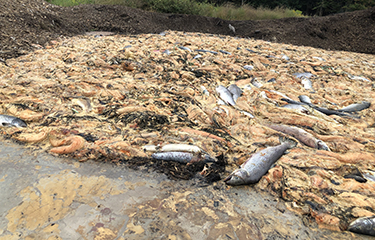Mowi has revised the original estimates of a salmon die-off at its Marine Harvest Atlantic Canada site in Newfoundland, Canada from an initial 92,700 fish to “up to 450,000,” according to a public notice.
The revision comes 10 days after the company announced on 11 September that the Atlantic salmon farming site was facing an “abnormal mortality event.” According to the new notice, 212,100 dead salmon have been removed from the site to date, with the company expecting it will remove up to 450,000 dead salmon – estimated to weigh three kilograms each.
All told, if the estimates are accurate, the company will have removed roughly 1,350 metric tons of salmon from the site – half of the 900,000 fish being raised there.
The company added in the notice that “further study is underway to determine causation of the low dissolved oxygen and develop further mitigation strategies to prevent recurrence."
“Sometimes Mother Nature will deal you blows, as farmers across Canada will tell you this summer,” Mowi Director of Communications for Scotland, Ireland, and Canada Ian Roberts told the Canadian Broadcasting Corporation. “What we had, we strongly believe, is a drop in dissolved oxygen.”
Roberts said that “a number of factors” could have contributed to a sharp drop in oxygen overnight in the salmon pen, leading to the mortality. He said the company had already installed technology to mitigate the issue at the site.
“Like any farmer, you’re devastated when you lose some of your stock to environmental challenges,” he said. “We will take the learnings from this event – this is the first crop of fish we’ve raised at this farm – we can look at this event and look to monitor more closely in the future to ensure we can react early to, perhaps, a drop in dissolved oxygen.”
Leo White, a spokesperson for the Newfoundland and Labrador Coalition for Aquaculture Reform, criticized Mowi and the province's regulatory bodies after the die-off was announced.
"This sounds like they were caught unaware that salmon packed tightly into a fixed net pen need a dependable supply of oxygen," he said. "[Mowi is] the biggest aquaculture company in the world. You would think that they'd have this resolved."
Newfoundland and Labrador Aquaculture Industry Association Executive Director Mark Lane called the event "very unfortunate," but told the CBC die-offs are unavoidable in any kind of farming.
"We have to remember that Newfoundland and Labrador has one of the most challenging environments for farming, whether that's farming fish or farming vegetables," he said.
Mowi’s announcement of further mortality comes as the Bangor Daily News reported Cooke Aquaculture is being investigated by the Department of Environmental Protection in the U.S. state of Maine regarding a die-off of salmon caused by “uncommonly low oxygen” at one of the company's Maine-based facilities.
Cooke Aquaculture Vice President of Public Relations Joel Richardson told SeafoodSource in early September that remediation work to clean up the mortalities at the company's farming site off of Black Island, Maine, was completed on 27 August, and that they were a “low percentage of our overall salmon harvest at the site.”
Richardson told SeafoodSource Cooke reported the incident to the Maine Department of Marine Resources as required, as it is the regulatory body overseeing aquaculture operations in the state.
“DEP stated that they had started an ‘investigation’ even though DMR is the regulating authority for a fish health incident,” Richardson said. “DMR already concluded that this event was, as Cooke indicated, an isolated issue of low dissolved oxygen which is not a compliance issue as far as our lease is concerned.”
That die-off has been picked up by opponents of the proposed American Aquafarms project in Gouldsboro, Maine. Protect Maine’s Fishing Heritage Foundation (PMFHF), along with members of “Frenchman Bay United” – a coalition of opponents to the salmon farm – said that the die-off “leaves many unanswered questions.”
“Among some of the more serious questions are what caused this, how did state agencies respond (or not respond), and what are the impacts on waters around the pens? Maine people, especially local fishermen and those who live and work in this area deserve an answer,” PMFHF Executive Director Crystal Canney said in a press release.
The opponents added that Freedom of Access Act requests indicate that the company didn’t notify the Maine DEP until 27 August, despite discovering mortalities on 16 August.
However, as Richardson pointed out, Maine aquaculture operations are required to report to the Maine DMR, not the DEP.
“We advised DMR first and then other state and federal agencies as a courtesy,” Richardson said.
He added that the company safely removed the mortalities quickly and disposed of the fish per the company’s standard operating procedure.
“We took all the responsible steps to safely remediate the situation as quickly as possible, including hiring a seining vessel for one day to help remove mortalities and clean and disinfect the wharf loading area and associated equipment to ensure a clean environment,” Richardson said. “While an unfortunate event, at no time was Cooke Aquaculture USA in violation of our permit through any department nor were there any environmental concerns given the company’s rapid-incident response.”
Photo courtesy of Protect Maine's Fishing Heritage Foundation







